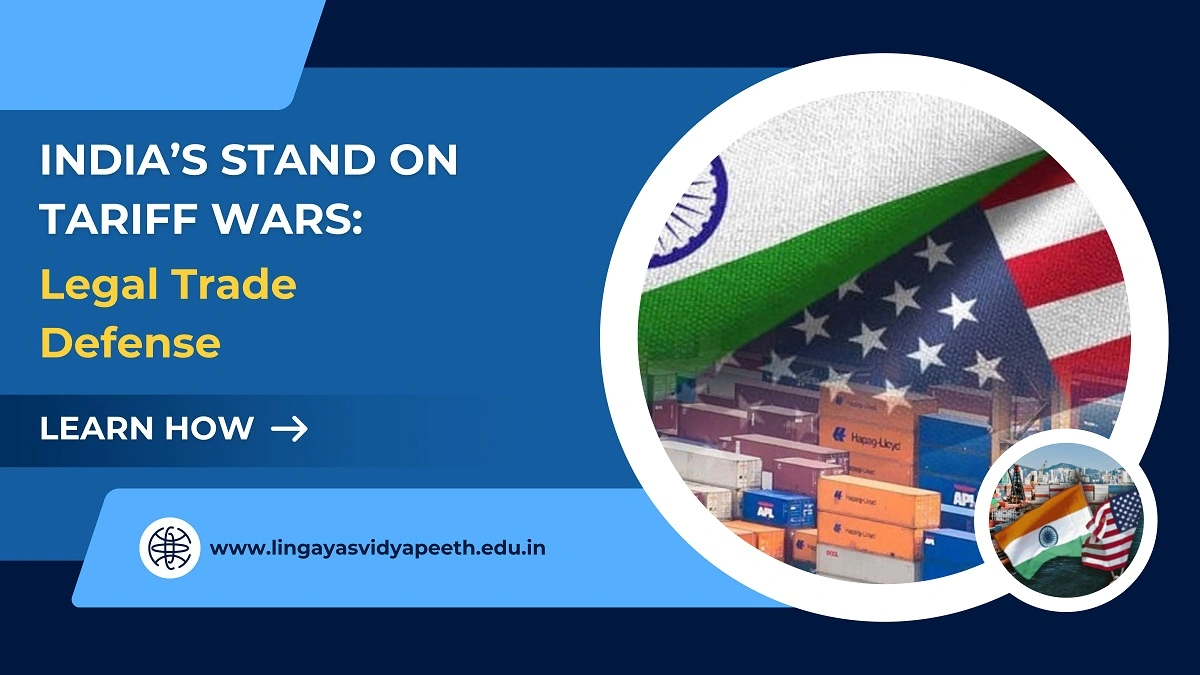Home » India’s Stand on Tariff Wars: Legal Trade Defense

Global trade has been unusually volatile in recent years, with tariff wars and import tariffs reshaping trade policy and international trade disputes. India — one of the world’s largest economies — sits at the centre of many of these tensions, especially with the United States and the European Union.
This post examines India’s legal strategy for handling tariff wars by analysing the constitutional, statutory, and international law frameworks that support India’s trade defense measures.
India’s approach to foreign trade and customs disputes rests on constitutional foundations. Article 73 gives the Union government administrative authority over subjects not assigned to states, including foreign trade relations. The Seventh Schedule places foreign affairs and imports/exports under the Union List, giving the Central Government exclusive jurisdiction over trade policy and trade negotiations.
Sovereignty is central to India’s stance in tariff wars. Indian leaders have stressed that the country will not yield to external pressure — a position rooted in the constitutional duty to protect national economic interests and trade sovereignty.
The Customs Act, 1962 is the primary statute for tariff policy, authorising the Central Government to impose and change customs duties (Section 3) and to provide exemptions and concessions (Section 25). These powers allow India to adjust import tariffs as a legal response to trade disputes.
The Foreign Trade (Development and Regulation) Act, 1992 creates institutional machinery for foreign trade policy and empowers the Director-General of Foreign Trade to initiate trade measures. The WTO Agreement Implementation Act, 1994 brings WTO commitments into domestic law, helping align India’s trade measures with WTO standards and enabling legitimate trade defence actions under international trade law.
The India–US trade row presents significant legal challenges. The U.S. imposed broad tariffs on some Indian imports, and additional penalties tied to certain purchases (for example, contested oil imports) have at times raised combined duties substantially. India’s legal response is built around layers of WTO-compliant steps, signalling a readiness to impose retaliatory duties under WTO rules if bilateral consultations fail — with specific timelines noted in some public statements (for example, duties planned after June 8, 2025, in prior notices).
The doctrine of reciprocity allows India to mirror other countries’ trade measures, but reciprocity must be balanced with WTO obligations including most-favoured-nation (MFN) treatment. India’s higher final tariff on many farm imports (reported at 39% by end-2024 versus lower rates in some developed economies) reflects the policy space developing countries retain under the WTO Agreement on Agriculture to protect food security and rural livelihoods.
The European Commission has initiated proceedings about India’s tariff treatment of Information and Communication Technology (ICT) products, raising concerns about WTO-inconsistent tariffs and their effect on Union economic interests. The EU’s consultations and possible application of enforcement measures highlight how tariff policy can trigger formal WTO dispute settlement and regional enforcement actions.
India’s trade-defence system uses established legal tools:
These measures follow procedural safeguards and investigation rules designed to ensure due process in trade remedies investigations.
International trade law requires that retaliatory actions be proportionate to the injury. India prioritises graduated, WTO-consistent responses: consultations, notifications, and, where needed, formal dispute settlement. Domestic processes are backed by parliamentary oversight, public consultations, WTO notification obligations, and judicial review of administrative actions to ensure transparency and legal accountability.
The Ministry of Commerce and Industry is the apex body for trade policy. The Directorate General of Trade Remedies (DGTR) — established in 2018 — investigates unfair trade practices and recommends remedies under a specialised legal framework. Regional customs authorities implement tariff measures while following procedural rules and international obligations.
Bilateral talks — including formal terms of reference for a US–India trade agreement referenced in public statements — may provide legal frameworks for settling disputes. New fronts such as digital trade, e-commerce regulations, and technology sovereignty require updated legal rules that balance national control with international commitments. India is also increasingly integrating sustainable development and environmental objectives into trade policy, linking trade law with climate and sustainability goals.
Despite trade tensions, India’s economic resilience remains strong, supported by a legal infrastructure for trade policy. The country’s strategy favours WTO-compatible actions that preserve access to global markets while defending national interests through calibrated responses and legal channels.
The effectiveness of India’s approach depends on democratic oversight — ensuring trade policy stays within constitutional bounds — and on technical capacity in agencies that manage trade remedies, trade negotiations, and legal defence at the WTO.
India’s approach to tariff wars combines constitutional authority, domestic statutes, and international law to protect economic interests while aiming to remain a responsible WTO participant. By using measured, legally grounded tactics — from trade remedies to diplomacy — India seeks to reconcile competing legal commitments, economic imperatives, and foreign-policy objectives. Continued institutional strengthening, legal clarity on digital trade, and careful diplomacy will determine how successfully India defends its trade sovereignty without undermining global trade ties.
Also Read
Best Law courses after 12th
Difference between advocate and lawyer
Career options after Law
Online Gaming Bill 2025: Know About India’s New Gaming Law
From
Sweksha Bhadauria
Assistant Professor
School of Law
RECENT POSTS
CATEGORIES
TAGS
Agriculture Agriculture future AI Architecture artificial intelligence Bachelor of Commerce BA English BA Psychology BTech AIML BTech CSE BTech cybersecurity BTech Engineering Business management career Career-Specific Education career guide career option career scope Civil engineering commerce and management Computer Science Computer science engineering Data science degree education Engineering Engineering students English Literature english program Fashion Design Fashion design course Higher Education Journalism journalism and mass communication law Law career Machine Learning mathematics MBA MBA specialization Mechanical Engineering Pharmacy Psychology Research and Development students
LV only conducts physical/online verification of any document related to examination on the following email id:
It is important to note that the following email IDs and domains are fraudulent and do not belong to our university.